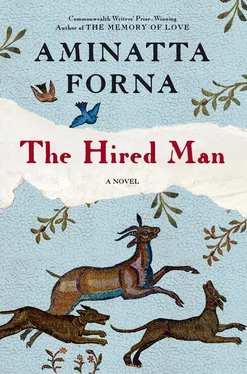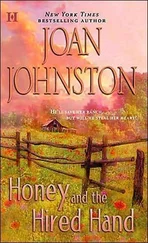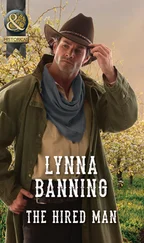‘Why do you say that?’
‘Hardly anyone comes down this road usually.’
Word was getting around: someone in the blue house. I said, ‘One of the roads is closed. Work on the water mains.’
‘I hope that doesn’t mean the water gets cut off.’
I reminded Laura she had a well.
I like to leave a job in a certain place, where I can pick it up easily. At the beginning of the day I set myself a goal and don’t stop until I’ve reached it. It’s just the way I am. I like to work hard and go to bed tired and begin again the next day, allocating tasks for myself in the right order and completing each one within the schedule I’ve set myself. I didn’t like my work to be disrupted or disturbed, even the school projects I laid out on the kitchen table when I was a child. I grew mad if anyone touched them. My mother complained to my father that I was stubborn. Not stubborn but single-minded, my father insisted, like him. Two men marooned in a household of women: my father always talked as though we were outnumbered, two to twenty instead of two to three. Perhaps it was because I was the youngest, petted by my sisters and my father, so easy-going; somehow we’d failed to stamp our masculinity upon the household.
Shooting was one thing we alone shared. My first shooting lessons were given to me by my father, I was barely taller than the gun, still watching Professor Balthazar on television after school. My father came into the house holding a rifle, he said, ‘Come on, chief.’ The Professor was on holiday in Switzerland, skiing and riding in trains. I turned the set off, jumped down and followed my father.
Learning to shoot is a lot like learning to play an instrument. In time I got to know my rifle the way a violinist knows his violin, every curve and line of the stock and barrel, the slide of the bolt, the pull of the trigger. From all those hours with my father I brought a single lesson. Patience, focus, control: in all things and especially in shooting. Aged ten I lost a shooting contest. It was at the local fair; I was nervous. My father put his hand on my ribcage, he told me I needed to learn how to still my heart. By the time I was in my teens I was winning every competition and I understood what he had meant: to go to a place within, to feel my heart shudder, slow and pause, hovering in advance of the next beat. To begin to beat again only after the shot had been taken.
When I was satisfied with the outside walls, I went to the courtyard and washed my brushes one by one under the tap, laid them out on a sheet of newspaper and made sure the lid of the paint tin was firmly in place. I washed my hands and splashed water over my face. I opened my eyes to find Laura standing in front of me.
‘Duro, Grace and I were wondering if you would like to stay and have supper with us.’
‘Thank you, yes.’ I dried my face on the sleeve of my T-shirt.
‘Good, we hoped you’d say that.’
‘First I need to wash and change my clothes.’
‘It’s just family.’
‘I must also feed Kos and Zeka.’
‘Bring them back with you, why don’t you?’
‘Thank you.’
It had been a while since I left the dogs alone for so many hours in the day; they were feeling sorry for themselves and let me know. I spent a few minutes raking their fur with my fingertips, searching for ticks, something they loved. On Zeka’s haunch I found one, already gorged with blood. He held still while I burned it off, but the damned thing burst and left a mess. I’d have to take a pin to remove the head later, now time was short. I fed them and let them follow me into the house. After I had showered I wiped the mirror and decided to shave. While I lathered my face I inspected myself as I hadn’t done in a long while. When you live on your own you forget how others see you. Overall I was not unhappy with what I saw. I had aged well, certainly compared to Fabjan and even Krešimir. I still weighed what I had at twenty and still had my hair and teeth. Every morning I performed the same exercise routine. Squats, pull-ups, crunches, push-ups: twenty-five of each. I went to the door and hoisted myself up, raised and lowered myself five or six times, counted to one hundred and let go. I shaved, found a pair of kitchen scissors and snipped at some coiled hairs growing in my eyebrows.
In the bedroom I chose a clean shirt. I dressed quickly and left the house with Kos and Zeka at my heels. It was still warm, a crane flew overhead and we followed in its path towards the blue house. I tried to think of the last time I’d shared a meal with anyone. The last family dinner I remembered was when Danica left Gost. Danica’s husband Luka worked for the railways and said the line through Gost was not so important any more, because the trains only came from one direction now. Osijek to Zagreb, Zagreb to Rijeka: that was going to become the most important. Wait and see. There were flats, he said, in Zagreb, vacated and going for cheap rents. Danica and Luka had their name down on a government list. Any tenant in social housing who left and didn’t pay the rent for six months would lose the flat and the flat would go to someone on the list, end of story. There were hundreds going spare. You had to act fast for the good ones. Some people just moved in and claimed they’d been living there for years. Sometimes it worked.
‘What if the tenants come back?’
‘Too bad,’ he shrugged.
Luka was confident. He roasted a lamb; there was walnut cake. Beer. My mother drank cola and red wine, her beloved bambus . A goodbye dinner, though no one said so. Luka went first, Danica followed, my mother the last. There must have been suppers in-between, but I have forgotten them. I felt no particular sadness when they left: at that time I felt very little at all. Later I felt it. Later still, I got used to being alone.
Every year Danica calls to wish me Happy Christmas and New Year and passes the phone to my mother. Soon enough she tells me there are still flats vacant in the building. Theirs has a view of the Sava. They sent me a photograph taken from the opposite shore of the river: a row of six or seven high-rise blocks: their image reflected in the steel water. The riverbank is straight, of soft, black earth. On either side there is what looks like a strip of no man’s land, though my mother insists it’s a park. There was a running track, she told me, as though she was thinking of taking up the sport. The first years were difficult. Danica had trouble finding work. My mother disliked leaving the apartment. Once she witnessed the trees being felled in Tomislav Square, some were one hundred years old. People gathered in front of the railway station to watch, cheering as each one toppled, though they were perfectly healthy trees. Sapling planes were planted in their place. These days Danica works as a tour guide and has introduced my mother to the city the way she does her tourists. For Mother’s birthday they visited the zoo, where my mother took a liking to the miniature hippopotamus. Then for a drink in Republica Square, I mean Jalačić Square, and then for supper on the terrace of the Hotel Dubrovnik. My mother liked the row of gift shops in the lobby, the restaurant with its red chairs and black-and-white-tiled floor, the buffet table covered in white cloths: my mother’s idea of glamour. Now she is in awe of the city and in love with the city at the same time. She rides the trams. Everything in Gost is small and far away and there are no trams. She never asks about the people she once knew.
At the blue house Grace was setting the table, folding napkins. Laura came in with a bunch of sunflowers, their heads already lolling on the end of their narrow stalks. She set about searching for a vase, rejecting those too small for the giant flowers. In the end she took a pot from the windowsill and filled it with water. She picked up the flowers, exclaimed and dropped them. I picked them up. Hoards of glistening black beetles crawled through the stamens of the discs.
Читать дальше












